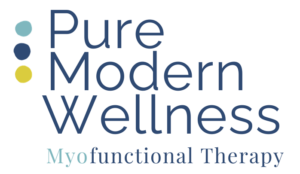What is myofunctional Therapy?
Myofunctional Therapy is a program used to develop tongue strength and mobility. A series of individualized exercises are used to develop or recapture correct tongue positioning at rest and during swallowing. Moreover, promoting optimal function of the mouth, face and airway.
We invite you to take a moment to become aware of your tongue placement and habituation. Where is your tongue? Are your lips closed? Are you breathing through your nose or mouth? Does your tongue touch your teeth when swallowing?

Because the muscles of the face and tongue are extremely strong, they impact development, speech, breathing and sleep patterns. If these muscles are not functioning properly, people may experience a wide variety of problems including: reduced space in the nasal cavity, narrowing of the facial structure, orthodontic relapse, TMJ pain, grinding the surfaces of the teeth, difficulty in eating and swallowing certain foods, digestive issues, sleep disordered breathing.
We specialize in the Adult Population
Goals of Myofunctional therapy
Tongue Posture
At rest, the tongue should be in contact with three spots on the roof of the mouth. Proper tongue posture assists in facial development allowing the teeth to grow in straight while assisting in keeping the airway open, allowing for continuous nasal breathing.
Swallow Pattern
When swallowing, lips should be sealed with the tongue pressing against the roof of the mouth doing all the work for the swallow. This assists in preventing excess air in the stomach, misaligned teeth, malocclusion, TMJ pain and speech issues.
Lip Competence
Lips should rest together during the day and while sleeping at night. Lip strength assists with proper swallowing pattern, stabilization of the hard tissues, contributes to the development of nasal breathing and encourages proper tongue posture.
Nasal Breathing
The nose warms, filters and humidifies air breathed in before entering the lungs. The beneficial production of Nitric oxide is established by nasal breathing, allowing for proper O2/CO2 exchange while increasing parasympathetic activity in the body.
Why tongue posture matters?
During sleep the throat and tongue muscles become relaxed, healthy habitual rest position is important while sleeping to prevent blocking of the airway from the soft tissues of the mouth and throat. In addition, fascia tension of the tongue may significantly impact body posture leading to overall restricted movement. Furthermore, nasal breathing has many health protecting functions for the body that is comparatively absent when mouth breathing.
Myofunctional therapy is often referred to as physical therapy for the tongue and face. Just like in physical therapy exercises, you get what you put it – it is hard work that is a lifestyle change that can impact you for the rest of your life.
Free 20 Minute Consultation Available



